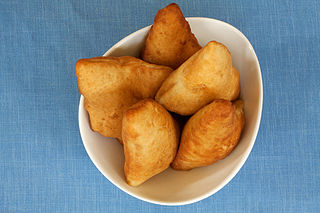 W
WBanana beer is an alcoholic beverage made from fermentation of mashed bananas. Sorghum, millet or maize flour are added as a source of wild yeast.
 W
WBeer and alcohol is an integral part of Tanzanian society and local brands hold a strong sense of national pride among the Tanzanian population. There is a considerable amount of brewing and drinking done in the country. Tanzania ranks 6th in Africa for beer consumption and contributes to over 3% of the African consumption. However, over 90% of the national consumption is either homemade or from the informal sector. Bottled beer is expensive for the majority of the population and is almost 6 times more expensive than the maize beers. Nonetheless, beer sales and taxes are a vital part of the Tanzanian economy.
 W
WChipsi mayai, also known as zege, is the most popular street food found all over Tanzania. The dish was invented in the streets of Dar es Salaam. in its most basic form, chipsi mayai is a simple potato-egg omelette. It is available in all regions of Tanzania, from the most remote villages to large towns. Food stands both indoors and on streets make them to order. It is the unofficial national dish of the country.
 W
WMandazi, is a form of fried bread that originated on the Swahili Coast. It is also known as bofrot or puff puff in Western African countries such as Ghana and Nigeria. It is one of the principal dishes in the cuisine of the Swahili people who inhabit the Coastal Region of Kenya and Tanzania. The dish is popular in the region, as it is convenient to make, can be eaten with almost any food or dips or just as a snack by itself, and can be saved and reheated for later consumption.
 W
WMtori is a popular Tanzanian stew made of bananas and meat, but it contain other ingredients.
 W
WNsenene is the Luganda name for Ruspolia differens: a bush cricket in the tribe Copiphorini of the 'cone-head' subfamily.
 W
WSukuma wiki is an East African dish made with collard greens, known as sukuma, cooked with onions and spices. It is often served and eaten with ugali.
 W
WUgali, or nsima, is a type of stiff maize flour porridge made in Africa. It is also known as vuswa, bogobe, fufu, gauli, gima, isitshwala, kimnyet, kuon, mieliepap, ngima, nshima, obokima, obuchima, obusuma, oshifima, oruhere, pap, phutu, posho, sadza, ubugali, umutsima, obusuma other names. Nsima is sometimes made from other flours, such as millet or sorghum flour, and is sometimes mixed with cassava flour. It is cooked in boiling water or milk until it reaches a stiff or firm dough-like consistency. In 2017, the dish was added to the UNESCO Representative List of the Intangible Cultural Heritage of Humanity, one of a few foods in the list.
 W
WZanzibari cuisine reflects several heterogeneous influences, as a consequence of the multi-cultural and multi-ethnic nature of Zanzibar's and Swahili heritage. It is a mixture of various culinary traditions, including Bantu, Arab, Portuguese, Indian, British and even Chinese cuisine.